SUMMARY
This is AI generated summarization, which may have errors. For context, always refer to the full article.
![[Only IN Hollywood] Ansel Elgort, Ken Watanabe, creators on addictive ‘Tokyo Vice’ season 2](https://www.rappler.com/tachyon/2024/04/tokyo-vice.png)
LOS ANGELES, USA – “It sounds like you’re asking her if the rice field is dying.”
Ansel Elgort can now joke about how he was motivated to really learn Japanese when his Tokyo Vice language tutor told him that.
Preparing to play Jake Adelstein, the real-life Japanese-fluent American journalist working for a major Tokyo newspaper, Ansel was going over his lines for a club scene in which he was dancing, approaching a girl, and saying something flirty.
Instead, what he said, according to his Japanese language sensei, sounded more like an inquiry about a dying rice field.
Ansel went on to study Japanese with such devotion that he now speaks it fluently. The actor’s intense commitment to Tokyo Vice reflects the care and dedication that the production poured into its loose adaptation of Jake’s 2009 book, Tokyo Vice: An American Reporter on the Police Beat in Japan.
Season one was a hit but season two, no longer saddled by a lot of exposition, is even better. The current season has a high Rotten Tomatoes rating of 92%.
Avoiding sensationalism, the 10-episode Tokyo Vice season two is character-driven, consistently compelling, and powered by solid performances led by Ansel and Ken.
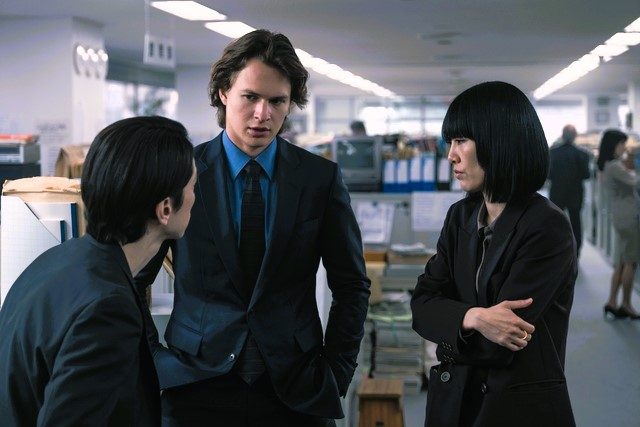
In a screening of the spellbinding season two finale, Endgame, followed by a panel discussion, we got to see and hear Ansel again since he talked to us in 2022 about season one.
This time, he brought the same Nikon camera he lugs along in his portrayal of Jake as he hounds the Yakuza. Ansel took photos of his costar Ken Watanabe (Hiroto Katagiri, the detective and Jake’s mentor) who joined via video from Kyoto, and after the panel, his other costar, Show Kasamatsu (Akiro Sato), happily posed for him.
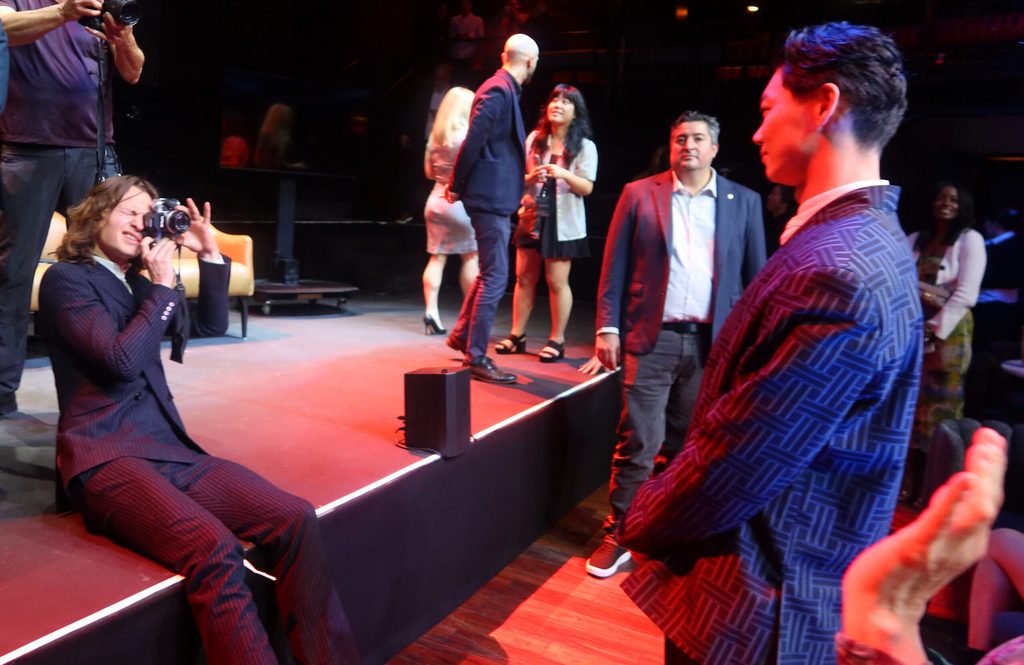
The panel also featured JT Rogers, the 1990s-set neo-noir’s creator and writer, and Alan Poul, producer and director. Journalist Stacey Wilson Hunt moderated.
Avalon Hollywood, the historic Spanish Baroque-styled nightclub that used to be known as The Palace, served as a beautiful panel setting for the Max original drama series which is occasionally set in Tokyo’s posh clubs.
Tokyo Vice’s cast includes Rinko Kikuchi (Emi Maruyama, Jake’s editor at the Meicho Shimbun newspaper), Rachel Keller, Ayumi Ito, Yosuke Kubozuka, and Miki Maya.
The following excerpts from the panel were edited for brevity and clarity.
Ansel, to portray a journalist working in Tokyo, you had to learn Japanese. How has your mastery of the language or near mastery of it allowed you more freedom as an actor in this role?
Ansel: Yeah, as you mentioned with the journalism, the whole thing was a journey about trying to be as authentic playing Jake Adelstein as possible.
Because he’s fluent in Japanese. When we meet him in season one, he’s already three or four years into his immersion, which is where I am now.
And so, I knew I needed to put a lot of work in. What I realized through learning the language was that it was also the gateway into the culture because so much of the language speaks to the culture.
You can’t quite understand the culture unless you can speak the language. The way you speak to people who are senior to you or above you is different from the way you speak to someone on your same level or a kid or something.
Because respect is so embedded into the culture, it’s also embedded into the language. So, learning the language is very important in terms of being able to immerse myself in it as well.
Did you worry about every Japanese word you were saying on top of acting, too?
Ansel: Yeah. Initially, we were just learning the sounds of it. Just memorizing a little song and then singing it.
But then I was rehearsing before we got to set level and I was with my acting coach, this amazing Japanese man who is a Japanese college history teacher and also a Japanese language teacher.
He’s great because he kept a drill with me. When I was acting, he kept saying, unless I said it exactly perfectly a certain way, he was like, what you’re saying doesn’t make any sense or it’s totally wrong, which I couldn’t quite believe.
An example is, in a scene where I’m in a nightclub and I’m dancing and I go up to a girl and I say (words in Japanese). I was having fun with it.
And he (teacher) said, “You know, that doesn’t sound…. Now you’re saying something completely different.” I said, “What do you mean? That’s the same thing.” He said, “No, because it’s not. It sounds like you’re asking her if the rice field is dying.”
So, at that moment, I was like, okay, I can’t do it this way. So, we practiced at least four hours a day, if not more.
And while it was a great challenge, it was so rewarding, because now I have this opportunity to learn a new language with this incredible sensei. He taught me how to write the language; he taught me about the history.”
“On our days off, we would go around Japan to historical sites, shrines, and temples. And he was so generous with teaching me the culture.”
“And so, I really embraced it and it helped with the performance, for sure. If I didn’t do that, I don’t think it would have been even more unnatural than it already is.”
How did living and working in Japan all these years change you?
Ansel: Any time you’re able to spend that amount of time in a new place, in such a foreign place, you know, you kind of are (changed).
Especially compared to New Yorkers, they (Japanese) are very patient. You know, like wait lines, you like to try to slip through and float and whatever.
But in Japan, people are able to be patient so I’ve learned patience, which I never had before.
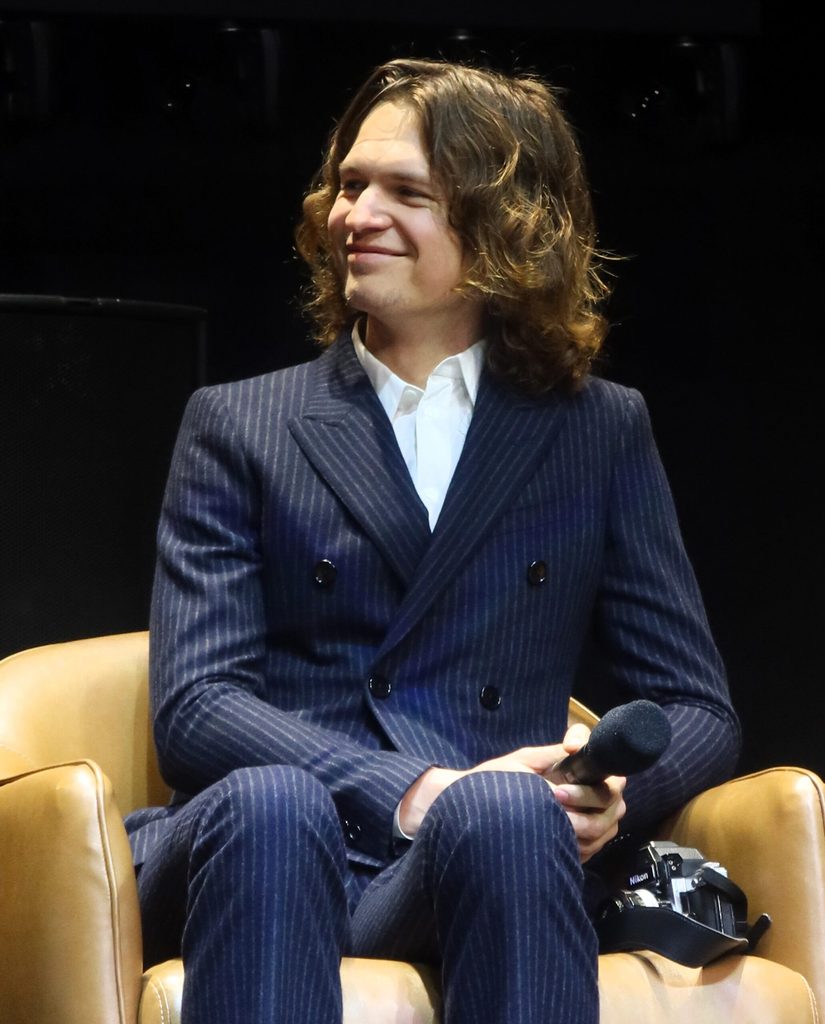
What was that like?
Ansel: It’s so relaxing. It has made my life so much better.
And then also, when I first went to Japan, there were all these rules. If you go to Japan, it’s kind of comical sometimes. There are always those signs with crosses through them that say don’t do this, don’t do this, don’t do this.
They’re everywhere. And there are just a lot of rules that in America, we would say, the customer’s always right or I’m in charge here or I don’t have to follow – that’s a silly rule.
In Japan, everyone follows the rules and it makes things work smoothly. So, at first, I would push back against it and ask, why do you have that rule?
You don’t ask why you have a rule because it’s been there for a long time and it makes things work. And now, again it’s very relaxing just to follow and so that makes the quality of life better.
Everyone just follows the rules. I mean, there’s some balance. Like in New York, we jaywalk, right? The jaywalking is out of control, though, if you ever drove in New York.
It’s like to the point where the cars are coming and it’s like, I’m gonna slip right into the middle of the cross. I’m not gonna do that in Japan.
But, if it’s the middle of the day, it’s a red light and there are no cars anywhere, you’ll still see people in Japan waiting for the lights to change. I’m not going to do that. I’m going to go.
Well, the complete transformation is not taking place.
Ansel: The thing is, it’s like, it never will. I’m never going to become fully Japanese, no matter what. I’m still an American and I still learned by being a New Yorker.
But I did learn so much from my time in Japan. I still love to go there and spend time there because it’s just given me perspective and yeah, it’s taught me so much.
Ken, we wish you were here but it’s nice to see you. How are you tonight?
Ken Watanabe: I’m filming in Kyoto right now and it’s the best season in Kyoto with the cherry blossoms.
In many ways, this event is years in the making. This is the first time you’ve appeared in person in front of an LA audience. JT, how does it feel to see your work seen in such a wonderful room?
JT: Pretty good. It’s been a long, multi-year journey with these gentlemen and so many people who are here tonight, and the crew. It’s very special.
JT, you have an interesting personal connection to Jake Adelstein, who wrote the book on which this show is loosely based. Please tell us about it.
JT Rogers: That will take 75 minutes but I’ll try. Real Jake Adelstein, real Jake, I call him Al. Real Jake and I met in Columbia, Missouri in driver’s ed class in high school.
And we’ve been close friends ever since. As you know, those of you who have been close friends in high school, you go years without seeing each other. Then you see each other, you just pick up because you have that special bond.
Over a decade ago, I was walking my dogs in Brooklyn, I hadn’t spoken to Jake in years and his number came up on my phone. I said, “Dude, it’s so great, how are you? I miss you.”
He said, “I gotta ask you a question. Have you been getting threatening phone calls in Japanese on your phone?”
And I sort of swirled in my mind and I said to him, “Well, I’m a little embarrassed because I have gotten a few messages, now that you mention it. But I just assumed they were wrong numbers.”
And as opposed to making a joke, he let out his sigh that was sort of like the painful air of a balloon coming out. He said, “I am so sorry JT.”
“I have discovered the worst secret of the worst Yakuza boss in Tokyo. He has discovered that I know and he is threatening my life.”
“He has stolen my phone book and he is calling the people I love the most and threatening them.” And I thought, now that’s a story.
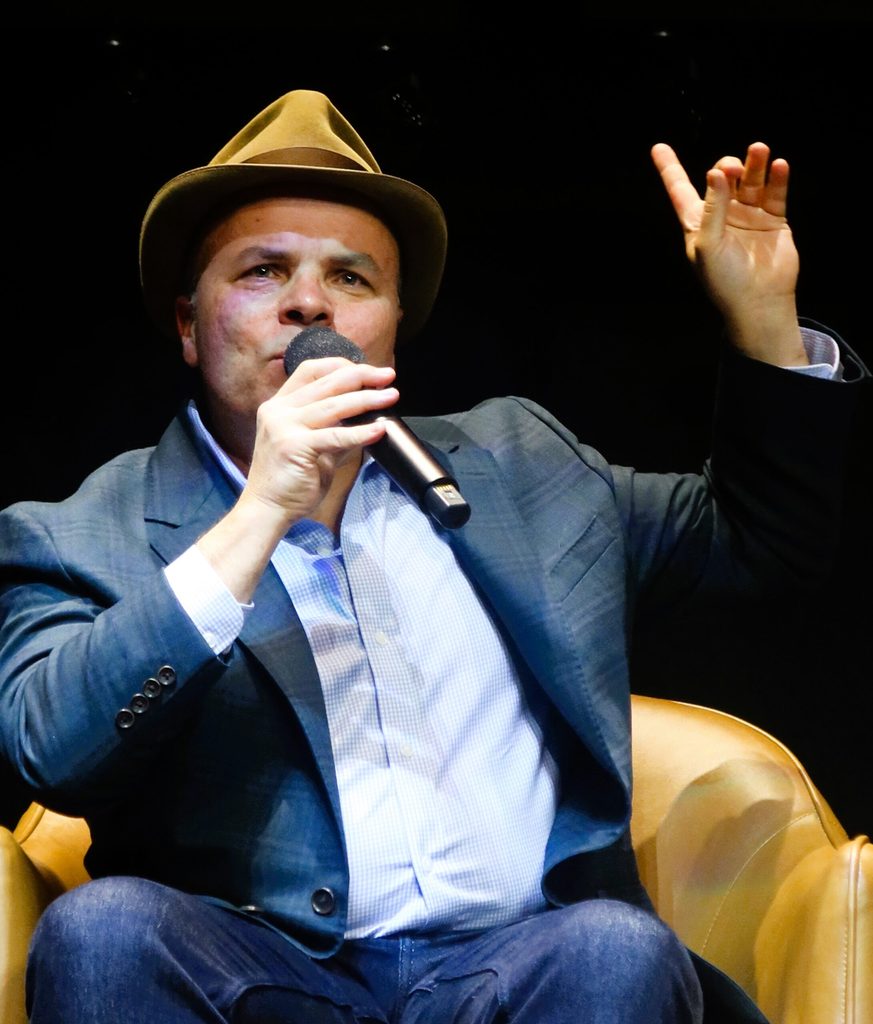
Were you afraid for yourself?
JT: No. There is no James Bond-ness in my life. In fact, when I came home and told my wife she said, “Wait, wait, I think you have a story.”
And so I moved to Japan and embedded myself with Jake, met his colleagues and it just became a long process. For those of you who work in Hollywood, as we all know, something you think will take six months takes ten years.
What was wonderful about getting to tell this story over 18 hours is you get the joy of long-form television. Not only the relationships you build with your colleagues but you figure out what new things you’re making as you go.
Now all along I knew, in some ways, sort of microscopically in detail, in some ways just abstractly at large, of how the whole thing was going to be. So, there are moments, for those of you who watched season one, when Jake and Katagiri first meet on the back porch.
They meet and Jake screws it up with Katagiri and apologizes. Katagiri says, “Why are you really here?” He says, “I want to learn how this whole thing works.”
And Katagiri tells him, “This is the balance of the problem.” Well, the entire series is that conversation. And that’s why we end on the porch, with the two grappling and experiencing that.
So, getting to do that has been quite extraordinary. And the last thing I would say is that, as Al and I talked a great bit between (seasons) one and two, oh, the realization that the real character in the show, the one that I didn’t realize was so prevalent was Tokyo.
So as difficult as it was, we needed to see even more of Tokyo in season two.
Alan, can you contextualize a little bit for those of us who aren’t super aware of the Yakuza’s history in Japan, the cultural significance of this crime syndicate, and how it differs from the organized crime and tropes that we’ve seen in Sopranos, etc.
Alan: The Yakuza, for those of you who don’t know, are so embedded in the history of Japan. They first emerged during the Edo period, which is the period that begins at the end of Shogun, if you can get that reference, and persisted in some of the shifting alliances.
They always found a way to attach themselves to people of value and money sources. And so, it’s a part of the fabric of society.
There’s a very telling moment in season one when Katagiri is asking Ishida to shut down the Chihara-Kai. And Ishida says, “Without Yakuza, there is no Japan.”
And there is truth to that. It’s still, even now, a sensitive subject, which came up time and again when we were trying to make the show.
But in this particular period, in the ’90s, there was a shift in the Yakuza and we express it through the difference between Ishida and the Chihara-Ktozawaai, Tozawa, and the Tozawa-Gumi.
And then Tozawa represents this new breed of Yakuza that came along and that was called, colloquially in Japanese, Interi Yakuza, which means intellectual Yakuza. They were smarter; they had MBAs.
They knew how to infiltrate the society in a way other than brute force.
And while they were making themselves very powerful in the world of politics, the world of business, as you see Tozawa doing, they also entered hugely into the meth trade, which is the Ishida side.
The noble path, the old-school Yakuza, would not go there. They went there big time and they caused a lot of damage and created a big meth addiction problem in Japan in order to support their activities.
Ken, how has your character changed in the show?
Ken: Starting season two, Katagiri is committed to his work and his family. However, after his boss changed to Nagata, who is aggressive, he decided to confront the Yakuza in new ways, including thorough rough investigations. Then we need the cooperation of Jake.
What do you like about working with Ansel?
Ken: We always talk about dialogue and which parts we can speak English or Japanese. And then at rehearsals, we talk about the lines.
I’ve been so comfortable with Jake.
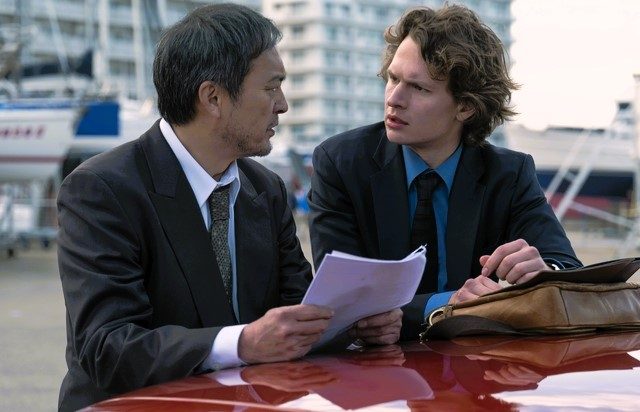
Show, what was your experience like acting on this show?
Show: Everything was a first for me. With the great cast, producers, and directors, I was nervous.
I auditioned ten times with Michael Mann and he chose me. Everything changed fast.
I had to study English. It’s so hard.
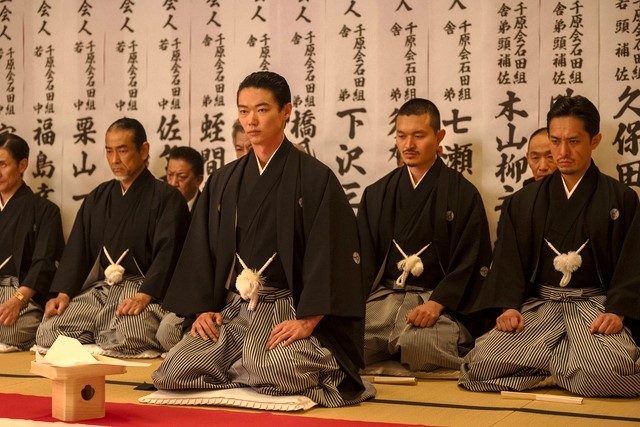
Alan, you recently told a reporter (Patrick Brzeski, The Hollywood Reporter), “Everything in this country is local, and everything runs on precedent.” It is a really interesting comment in terms of how it refers to the production of this series. In what distinct ways does that impact the way you made the show?
Alan: I would say in the macro, in terms of precedent, a friend of mine who had worked in Japan said to me, with everything you do in Japan, there are only two ways to do it. The way that it has always been done or the way that it has never been done.
So, were they averse to having productions because the risk was just too high?
Alan Poul: The bottom-up part is that in Japan, the citizens are very empowered. And in LA, we have movie (set) cops and the movie cops come in and say, don’t stand here, you have to go behind the lines.
And they serve the street (notices), we’re closing it off and everybody can shoot. In Japan, that’s not possible because you don’t have the right. Even the police don’t have the right to say to somebody who can’t pass you.
So, when we’re shooting on location, the local vendors and the citizens have an enormous amount of power. We have to ask for their goodwill.
And that takes talking, sweets, rice crackers, and gifts and generating a real sense of personal connection and trust before they will let you come in.
This happened to us on the pilot – if you try to block the street and an elderly woman is coming home from the convenience store with her bag and you tell her, you can’t go to your house right now, they’ll shut you down. If she goes to the police, they will shut you down.
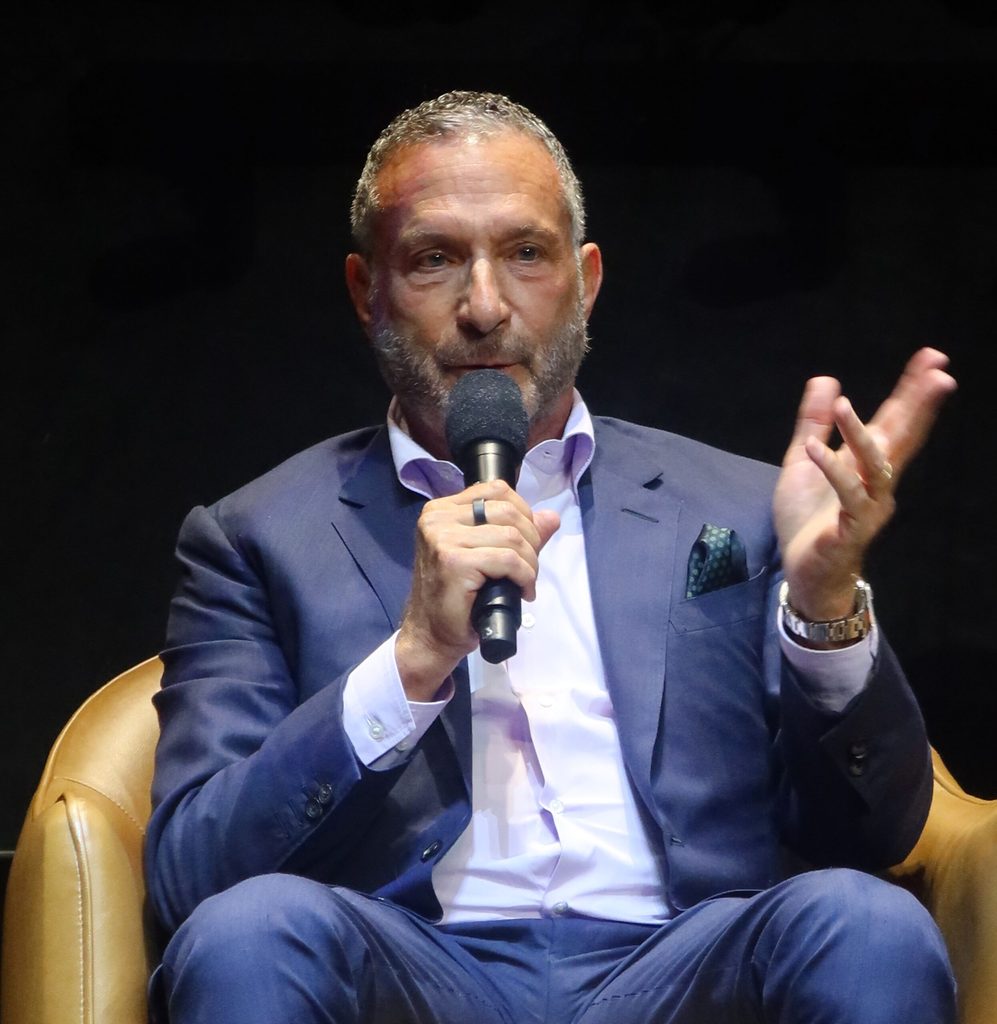
Can you imagine that happening in LA? That is amazing. You had wider options for season two because the pandemic was over, or at least the immediate threat of the pandemic was over. What location or opportunity most excited you in terms of being able to expand the story and shoot on location?
Alan: Two big changes happened between the first and second seasons. One is there was no pandemic.
The second was that the first season had aired on Wowow, a premium satellite network in Japan, and that had been very well-received. So instead of these gaijin, these foreigners, who were coming in likely to get everything wrong in the midst of a pandemic, we came back with much more stature.
We were able to attract the support of several members of the Japanese parliament, and specifically the governor of Tokyo, Yuriko Koike, who became a fan, and also the newly appointed US Ambassador to Japan, who is Rahm Emanuel.
He (Rahm) is no stranger to the entertainment business and so he gave a big party at his private residence for the entire cast and crew. He came to the set and so it was night and day in terms of the way that we were perceived.
And that helped us in some way in the negotiation with the police and allowed us to get access. And the article that Patrick wrote sort of details what was our greatest achievement.
We were able to shut down one of the busiest nightlife streets in one of the highest-class nightlife districts in Tokyo, Akasaka, for an entire night to shoot the aftermath.
I guess I could say it now – people are seeing it – the aftermath of the shootout in this club, when Jake comes home on his bicycle. That’s different, though.
That street had never been closed off before. And although it looks like something you might normally be able to do in New York, in Japan that’s historic.
JT: But even to underline how complicated it is, Alan was spirited at that. So, it’s about seven months of conversations to get that street done.
And then one night, we have all that, multiple scenes, screenshots, everything. We’re all ready to go and all of a sudden, people are walking. And we’re like, wait, but the street is closed.
But there are the cars. And so, me, of course, I had to work for a bit but you have to constantly be rolling.
We talk about this still – you can’t say enough about our production but our location teams, specifically. For them to be given, hey guys, here are 10 hours of story, here are the locations I need, how about it? It’s incredible.
When they were able to finally come back and have conversations, they said, well, this one is impossible, so what about this instead? Well, let’s change that or we’ll rewrite that or no, we really do need that. Is there someone we can find?
It was a train that never stopped but it’s on the screen what they were able to achieve, I’m quite proud of that.
Ken, do you have friends in the police department who sort of guided you through your portrayal?
Ken Watanabe: Unfortunately, I don’t have friends in the cops. I read so many chapters and then I researched about the 1990s through a book and that’s it.
Show, did you ever meet anyone like your character Sato who’s in the Yakuza or who had been in the Yakuza?
Show: Do you know onsen (hot water baths)? I went to an onsen close to my home and then someone asked me, hey, are you Sato? I looked at him and he has a lot of tattoos so I just said, ah, yeah, thank you so much.
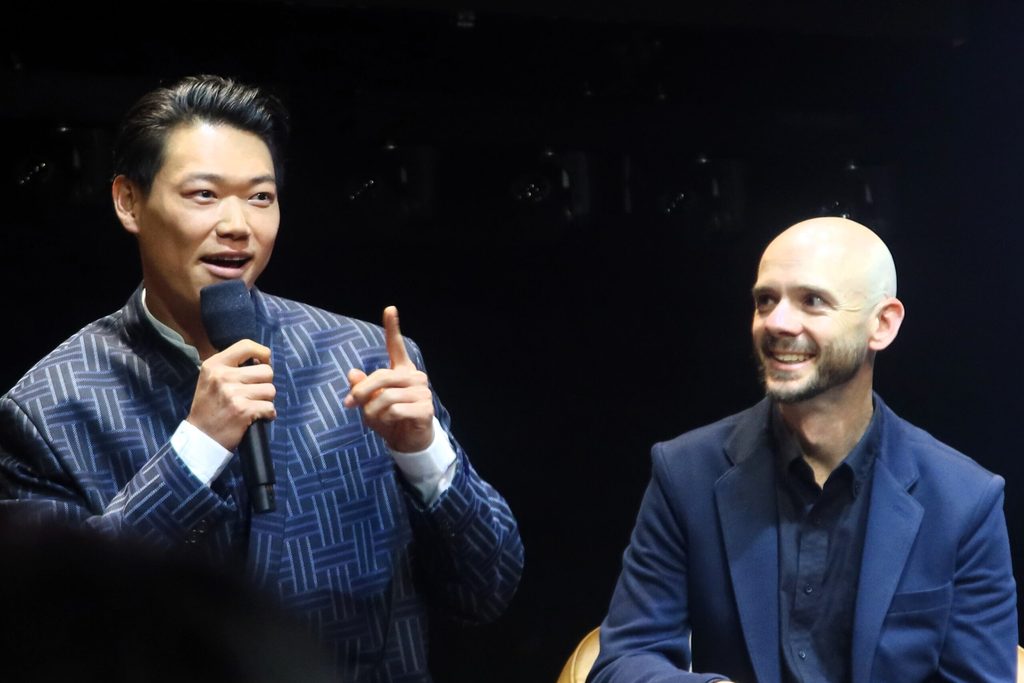
Alan and JT, can you close us out by reflecting on what you are most proud of in having executed season two?
JT: There are so many things, looking at it now. I watched this last episode, as Alan asked, maybe a hundred times, chapter, edit, after edit, after edit.
When we would come and tap him on the shoulder to please come back right from the end, my first instinct was, I want to watch that scene again, I like that scene. So you’re not tired of it, you actually see it, which is rare for me.
I usually can’t not run away from something I’ve made. The totality and the complexities of it are the things I’m most humbled by and proud of by the end of season two.
This show meant so much to hundreds of people who made it. I’m a bit of a softie.
Sometimes I would get a little teary on set, just watching people sleepless, doing their job, coming up and congratulating an actor on the scene and you know it was extraordinary. I feel good.
Alan: What he said basically. This is why we did it. But first of all, I want to give a shout-out to the director (Josef Kubota Wladyka) of the episode who is not with us tonight.
And Corey Walter and Dan Satinoff, who shot the entire season with us. We had to find our way there, to create a show that worked as a crime story, first and foremost, and that showed off the city in a spectacular way, had lots of action, some shocking violence, and some sex.
That it’s really about the people involved and it’s about a very humanistic vision of the moral conundrums that we all face in whatever walk of life that we’re in.
And that’s what JT writes so well. To me, I think that gets through and that’s what the show is. – Rappler.com
Add a comment
How does this make you feel?
![[Only IN Hollywood] Ansel Elgort jumps from ’50s West Side to ’90s yakuza underworld](https://www.rappler.com/tachyon/2022/04/ansel-tokyovice.jpg?fit=449%2C449)
There are no comments yet. Add your comment to start the conversation.